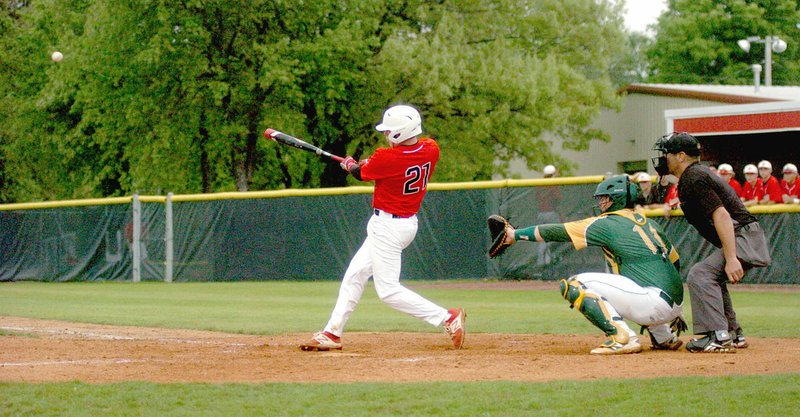FARMINGTON -- When an infield hit took a funny bounce getting past third base and shortstop, Farmington's Ryan Larkin broke off pursuit and immediately returned to his station at third base.
As the last infield line of defense before a base-runner breaks for the plate, Larkin understands the importance of guarding home. The son of recently-retired U.S. Marshal Johnny Larkin, Ryan has grown up having the responsibilities of protecting home instilled within the core of his being.
Game Plan
Of all the life or death responsibilities a law enforcement officer is charged with, guarding the hearts of the family he treasures may be the most important.
Every officer longs to return home, whole, to their spouse and children from each shift; yet inherent danger to law enforcement exists.
Evil is out there.
Refusing to acknowledge its potential doesn't reduce the risks to those sworn to protect and serve the public interests. In order to do their job, they must be willing to put their lives on the line daily.
The officer who prepares his family for the worst day of their lives -- is giving them valuable tools they will benefit from in the days, weeks and months ahead. Hopefully, that day never comes, and even if they never have to face such a crisis, the family is still better for having been included in the game plan.
On the opposite side of the coin, holding inside all of the frustrations and perils of the job may place unwarranted stress on the family.
Family Dynamic
Johnny Larkin, of Farmington, recently retired from the U.S. Marshal Service. His son, Ryan, a senior who will graduate in May from Farmington High School, knows how a family dynamic functions behind-the-scenes when a parent is on active-duty law enforcement.
"The law enforcement side definitely rubbed off," Ryan said, describing his dad as always being very strict. "He always asked if I made my bed."
There were standards. Ryan was expected to keep his grades up. His high school GPA is 4.05. The only B Ryan has received in high school was in Spanish, a class he found difficult, yet scored 89 percent in the class. He has brought his overall GPA up with an AP Language class and is currently taking Calculus.
The self-discipline instilled by Ryan's parents, Johnny and Lisa Larkin, has shaped his world view as Ryan plays baseball for the Cardinal varsity as a third baseman.
"I don't want to be the stereo-typical jock, who doesn't do his work, who doesn't care about school," Ryan said. "I want to be someone, who not only excelled at athletics, but who excelled at education."
"I want to thank my parents for not making everything easy on me and for teaching me a good work ethic," Ryan said. "I think that will help me later on in life. When somebody doesn't want to do the extra work to get that job promotion, I do want to do the extra work so I can get that job promotion."
Vilification Hurts
Ryan thinks the social trend to vilify law enforcement in a general sense hurts families of officers. Vilify is defined by Merriam-Webster's free online dictionary as to lower in estimation or importance or to utter slanderous and abusive statements against.
"I don't like the way things are now with everybody with their views on cops, thinking all cops are bad," Ryan said. "That kind of bothers me because I know from experience that not all cops are bad."
Encountering Criminals
By the nature of their profession, odds are that a person in law enforcement will encounter someone hostile, even criminal, at some point. Ryan remembers being seven or eight years old and learning his dad had been involved in a shoot-out. The family gathered to process the event with Ryan and his sister, Brooke, who is three years older, accompanying their mother to the local U.S. Marshal's headquarters.
"One time he got into a shoot-out with a guy, we went up to his office and got to see pictures of the guy he was in the shoot-out with," Ryan said. "That was interesting."
Family Debriefings
Emergency agencies typically issue an internal after-action report. This is standard practice. An after-action report may include a debriefing to help individuals cope with the intense nature of hazardous situations and environments they may be subjected to while on duty. Families may be included in debriefings because they form the core of the support structure for each employee and can help diffuse post traumatic stress.
To Ryan, his dad always seemed all right, yet Ryan acknowledges he could tell when his dad was frustrated.
"He'd always come home and we'd talk about what went on at work," Ryan said. "If he was going to do anything dangerous we'd talk about it and he would warn me. I would always think about him throughout the day and hope that he was OK."
Ryan appreciated his father's briefings and the steps taken to personally educate him and his sister about the risks associated with carrying out law enforcement assignments.
"As a kid, you might not understand if he doesn't come home one day," Ryan said. "You're just kind of confused."
That scenario was something Johnny Larkin worked to ensure his children would never experience.
By grace, he came home every day.
Sports on 04/26/2017
